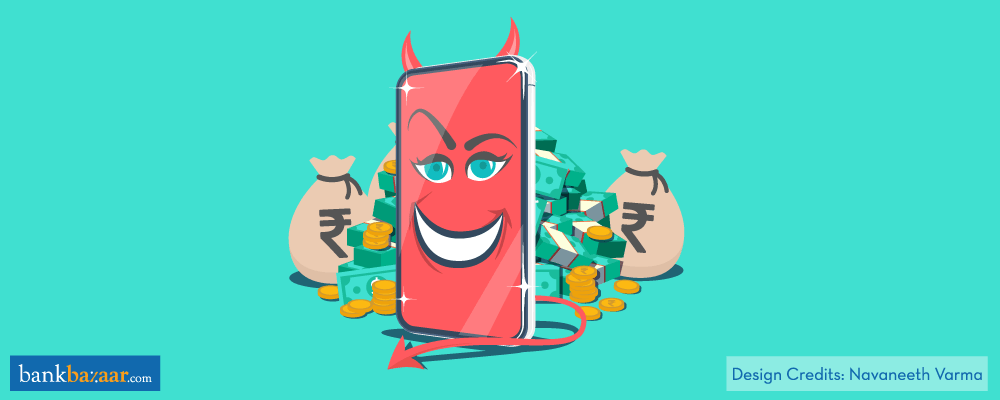
The world’s most envied smartphone launched its new generation of phones this week. The iPhone X, whose top-end, 256 GB model reportedly costs Rs. 102,000, is the most expensive smartphone today.
No doubt, a beautiful, shiny new phone would provide you great satisfaction, utility, brag value, and the respect of peers. Having a great smartphone solves many problems today. Not only do people find amusement in their many features such as selfie cameras and emojis, smartphones also provide utilities such as mobile payments and cab booking. Our world revolves around our phone. But how does a phone this expensive fare when you look at it from the point of view of investment?
An electronic item is ultimately a depreciating asset – it starts losing monetary value the moment you purchase it. On the other hand, wealth is created through the purchase of appreciating assets – think of real estate, Mutual Funds, gold, etc. Owning certain depreciating assets may be a necessity at times. But before you blow up a lakh rupees, make sure you’ve earned this luxury. Make sure you’ve made the following smart money moves which entitle you to indulge yourself – all for less than the price of an iPhone X.
Buy A Life Cover For Rs. 2 Crore
If you have dependents, you should protect their long-term finances by buying a term insurance plan. A salaried male, aged 30, with no tobacco habit can purchase a lump sum cover of Rs. 2 crores for 30 years, for premiums starting from just over Rs. 21,000. As a person with dependents, you should prioritise this purchase before you indulge yourself in any manner. An adequately sized life cover will protect your loved ones and cover their long-term money needs that may range from rent and EMIs to providing your surviving spouse an income to pay for your child’s education.
Buy Health Insurance Cover For Rs. 5 Lakh
Every person should have his own health cover. However, in India, people are shockingly under-insured. A media report in 2016 quoting the National Sample Survey said over 80% of the country isn’t protected by Health Insurance.
Shockingly, 66% of the richest persons surveyed were also not insured. This reveals a lack of awareness of why Health Insurance is necessary: it is to protect you from draining your savings during a hospitalisation. Suppose you’re a married 30-year-old with one child, you can buy a family floater plan of Rs. 5 lakh with annual premiums starting from around Rs. 11,500.
If you were buying it just for yourself, the costs would be much lower. If you already have Health Insurance, consider buying an adequate top-up especially if you’re approaching an age where you may be susceptible to health problems.
Mutual Funds
Mutual Funds are becoming a highly popular way of investing, and why not? Most Mutual Fund schemes allow you to invest with amounts as small as Rs. 500. You can invest monthly, or via lump sum. You can liquidate your investments when you need the money. And you can invest towards objectives of any kind – be it wealth creation, tax saving, or saving up for another investment. The equity mutual fund category has provided long-term returns ranging between 10-15% per annum in the last ten years, beating returns from small savings schemes. If you have spare cash lying around, consider putting some of it in a mutual fund to save for your life goals—and only then consider buying an expensive smartphone.
The equity Mutual Fund category has provided long-term returns ranging between 10-15% per annum in the last ten years, beating returns from small savings schemes. If you have spare cash lying around, consider putting some of it in a mutual fund to save for your life goals—and only then consider buying an expensive smartphone.
Settle Your Loans
Interest rates have been trending downwards in the last three years. With the rate cut in August, they may have bottomed out for the foreseeable future. This is a great time to take stock of your Home Loan, Car Loan, or any other loan or high value that you may have. Use the low-interest period to make principal pre-payments. This would save you a lot of money in the long term, and is especially useful when you’re in the first half of your loan tenure.
Emergency Fund
Emergencies come unannounced. They could come as a job loss, an accident, or damages to property. Everyone needs to prepare a fund to tackle these contingencies. A typical emergency fund should be at least three to six months of your regular income, and it should help you cover your regular expenses such as rent, EMIs, groceries, insurance premiums, utilities etc. If you don’t have a fund, you should use your surplus cash to prepare it. If you already have an emergency fund, take stock of its value and top it up to match your most recent income level.
All the ideas suggested above cost only a fraction of the iPhone X, or as much as a no-frills smartphone. If you haven’t worked on these five smart money requirements first, you should postpone your phone purchase. Once you have the financial cushion of insurance and surplus funds, only then should you start indulging yourself.
BankBazaar is a leading online marketplace in India that helps consumers compare and apply for Credit Card, Personal Loan, Home Loan, Car Loan and insurance.